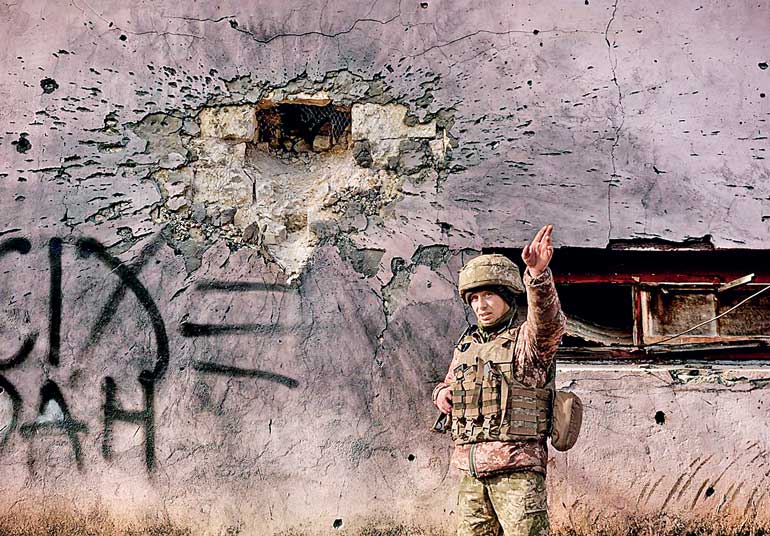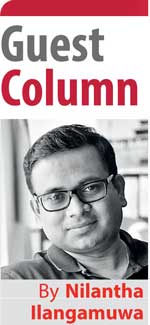Tuesday Feb 17, 2026
Tuesday Feb 17, 2026
Tuesday, 1 March 2022 02:49 - - {{hitsCtrl.values.hits}}

Western power is no longer the healer but rejected opportunist
A spy turned politician the Russian President Vladimir Vladimirovich Putin last Thursday morning surprised the world by announcing that he is launching a military operation to demilitarise and ‘denazify’ Ukrainian soil. The art of operation proved that the President and his inner circle had been planning it for years. It may have been planned even before Putin annexed Crimea in 2014. He was clear about the operation, and he did not hesitate to explain to others what he is going to get out of this. 
What is remarkable here is that many of Putin’s carefully chosen words to express his views have been used repeatedly over the past decade to justify the subjugation of their enemies by Western nations, including the United States. Denazification is a term coined by the Pentagon that was used in the early 1940s in relation to the post-war German legal system. His commands proved that Putin is a dangerous and meticulously calculative strategist but his enemies often get him wrong. Many driven by Western thoughts of school do not seem to be trying to understand their crowned opponent except hating him.
The conflict between the two countries is significant for global politics and the economy. Putin will benefit if Russia is able to end the ongoing military operations in the shortest possible time, as Israel did in the Six-Day War. But if the current conflict escalates into a civil war, it will create the circumstances for the West, including NATO, to achieve their goals. Putin’s enemies’ main objective may be to turn the conflict into a decisive event in his politics and power. However, if any party tries to manipulate the conflict to decide Putin’s fate, it is inevitable that Ukraine will become another Afghanistan. Therefore, the leaders of all parties involved in this crisis must return to examine the consequences of their actions, not to use Ukraine as a supplementary to fulfil each other’s political ambitions.
What has happened so far shows that the current President of Ukraine, Volodymyr Zelenskyy who earned little political experience and his government are overconfident of Western allies and his immaturity of geopolitical trends. Blaming other European countries for isolating him proves how politically ignorant and weak he is. Nor can it be observed from listening to his comments that he has a deep understanding of the historical relationship between Russia and Ukraine and its impact. As one report questioned, he may be the most vulnerable leader Europe ever had. A country’s foreign policy is the art of setting priorities, not of appeasing friends when they make false promises against your (theirs) enemy number one. Ukraine is a country with a history of more than three decades and has been under foreign rule since time immemorial. Also, throughout history, Ukraine has been an inseparable part of Russia. Even towering personalities who strongly opposed the Russian Communist regime, such as Alexander Solzhenitsyn and Joseph Brodsky, insisted that Ukraine was an integral part of Russian history and indeed of Russia. Undeniably, the Ukrainians were a decisive factor in Russian history. They live in a country with a complex history and a multilingual and multicultural composition.
True, they have their lamentations. Throughout history, Russian hegemonic culture has manipulated the spirits of Ukrainian identity to their liking. In particular, the 1863 Valuev Circular and the 1876 Ems Ordinance identified as longstanding strategies of imperial policies against the Ukrainian language. It is a common occurrence that the people living in such land are divided into different factions and fight for their might. That is a basic fact that history teaches us. It is not reasonable to dream that such a complex crisis could be solved just by joining NATO. A national leader who wants to keep his country and her people out of the boiling water and understand the potentialities of its neighbours should focus on reconciliation and constructive approaches to compromise between the factions within the country to curtail the internal rifts.
Incontrovertibly, the situation in Ukraine is absolutely grim. Unification between the factions without a mutually acceptable mediator is a smokescreen. Unfortunately, the West has not yet been established to identify the root causes of the conflict but aims to achieve narrow political desires. The only tool most Western countries have against Putin is to impose sanctions on Russia and its allies. Western ideology does not tend to make a positive intervention in resolving conflicts other than relying on sanctions frenzy. Is there a country that has changed for the better because of sanctions? Sanctions are an inhumane act that has proven incapable of solving any socio-economic problems but worsening the human conditions of each target
jurisdiction.
Committing a series of atrocities and throwing people into the abyss like what they have “accomplished” in Afghanistan, Iraq, Syria and Libya, have eroded the confidence of Western political power globally. Western power is no longer the healer but rejected opportunist. The West lost the trust but nowhere one can see that they are planning to rejuvenate it. The hypocritical politics and putrid strategies of the West have been proven once again by the man-made famine that the United States has created throughout Afghanistan, uniformly horrible to what Ukrainians have gone through during the Holodomor in
early 1930s.
It is no exaggeration to call the crime of plundering more than the $ 9 billion worth of Afghan foreign assets one of the most heinous betrayals by a single state in human history. In such a context, humanitarian solutions to violent conflicts require the intervention of a positive and qualitatively complementary alternative camp. Only such a firm and sincere mediator can prevent Ukraine from becoming another Afghanistan. If human civilisation fails to fill this serious vacuum immediately, no one would have the capacity to predict the consequences.
(The writer is a journalist and author. The views expressed in this article are the writer’s own and do not reflect the official policy or position of any other organisation or employer he is affiliated to.)